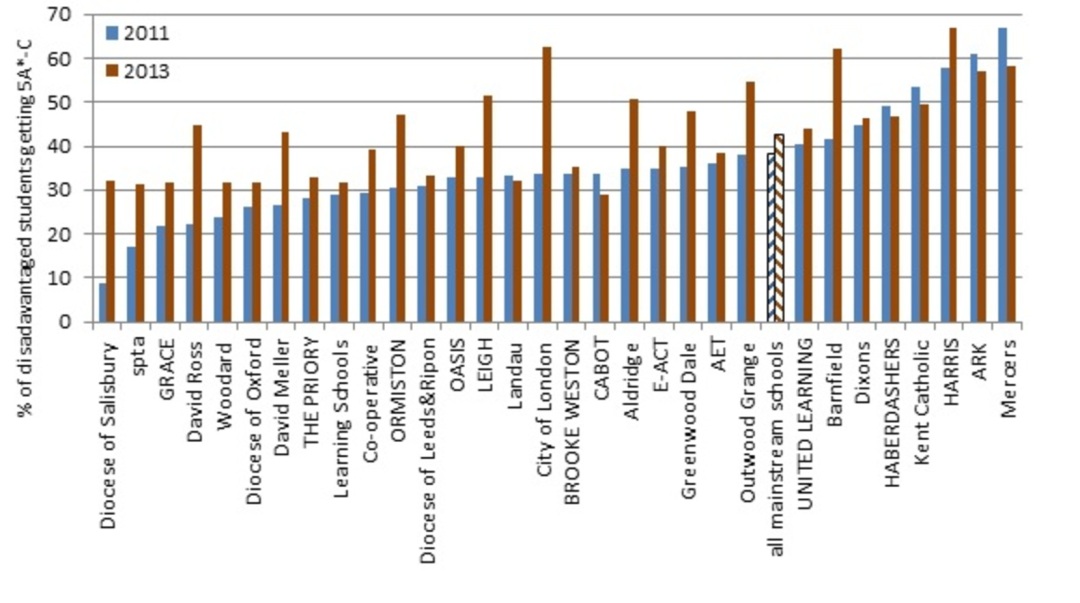Research 2015 Saturday 5th September 2015 South Hampstead High School – London
“Enlightenment, understood in the widest sense as the advance of thought, has always aimed at liberating human beings from fear and installing them as masters. Yet the wholly enlightened earth is radiant with triumphant calamity. “ Dialectic of Enlightenment
This blog is focused on a couple of the lectures I attended.
In one talk Becky Francis and Merryn Hutchings outlined research from Chain Effects. This analysed the success of Academy Chains in relation to disadvantaged students by looking at their exam results. What they discovered (unsurprisingly) was that some chains did better than state schools and some chains did significantly worse – furthermore the difference between the two was widening. They argued the government needed to take action with academies just like schools and they needed the same level of scrutiny. They also suggested that failing academy chains needed to look at more successful chains such as Harris and Ark.
The creation of successful schools was focused on exam results – the discussions that followed seem to be concerned with replicating those results. It seems a narrow focus. It concerns me that more questions are not asked about the means to achieve these ends; particularly in these times of increasing workload and teacher burnout. We seem to being using research, evidence and reason to further an end in education that is uneducational. Results at any costs are not results. However we don’t seem to really know or have looked at how these results are gained.
Yes, we can find ways to be ever more effective at wringing progress out of our students and driving teachers to enable ever more successful students. The system proves itself successful in its wilful betrayal of its own end. At the same time research loses its objectivity by focusing on objective data.
I want to know more about the student experience and staff experience of these places. I live close to a number of successful Harris Academies and a few friends have worked for them. The majority tell of bullying and 12 hours days – leaving exhausted as soon as it was possible for them. A friend of mine had a nervous breakdown soon after joining a Harris School. This is a worrying picture of a successful chain. But if these stories are true then what do we really have to learn from these schools?
The question of what ends education meet is sometimes dismissed as a distraction. For example bloggers like Old Andrew claim “It doesn’t take much consideration to see why making kids smarter is the true aim of education.”
It seems to me that the success of these schools in making kids brighter has led to a great deal of failure. Many schools seem attracted to the ideas of successful chains do indeed try and copy their methods – a corporate approach and micro-management of teaching seems now much more popular. These days Quality Assurance is a mechanism for gaining control of teachers and a removal of their professionalism; often in the name of seeking greater improvement in the impact of teachers on their students and their academic success. Unfortunately teachers no longer have a say in the means to the ends.
Of course – there are head-teachers that do offer an alternative voice however progress, Ofsted and data seem to be drowning out these voices. There are conversations around intelligent accountability.
In a later talk it was noted by Philippa Cordingley that extremely successful schools – as opposed to just good schools – relied, controversially she noted, on a narrow vision of pedagogy to ensure success.
It was a brief comment but again what is meant by success –was this measured only by exam results? I think there is more of a story and narrative that needs to be told about the development of education and the improvement of schools. This story needs to look wider than data, question purpose and take seriously the diverse stories and perceptions of staff and students. I didn’t find much that questioned reality but a lot of things that that tried to explain reality. There’s a growing emphasis on student as an individual psychological mind devoid of character, content or culture. Students – particualrly disadvantaged ones – are problems needing to be solved by research.
Academics and teachers often acknowledge and draw attention to the limitations of research – this doesn’t seem to change the placing of faith in a particular narrowly defined kind of research.
Attending events like this is a reminder of the amazing dedication of teachers and their commitment to a moral purpose to do the best for their students. Research that holds to enlighten us but does this without questioning the ends ultimately provides its own myths. What do really know about the nature of the successful academy chains? Why is the search for educational progress and success producing quite so many unhappy teachers?

One thought on “What makes a successful school?”